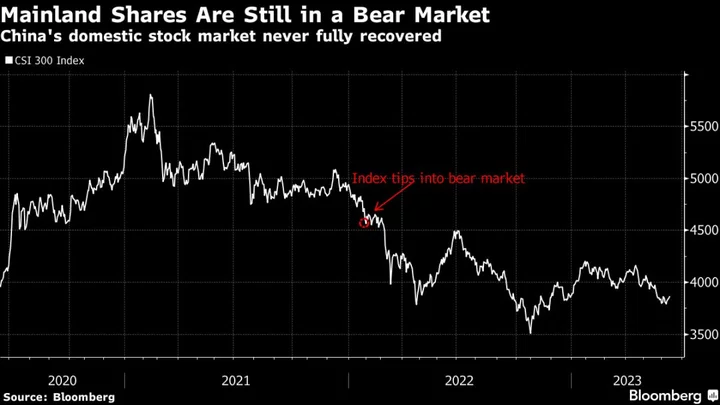The lack of confidence is so entrenched among China’s equity investors that government efforts to boost growth are repeatedly met by calls for Beijing to do more.
Tuesday’s interest rate cut from the People’s Bank of China drew little enthusiasm from equity traders, with volumes about 25% lower than recent averages. Even news that China is considering a broad package of stimulus measures only boosted the CSI 300 Index by half a percentage point. It’s been languishing in a bear market for close to one and a half years.
This was supposed to be the year to buy Chinese stocks as investors counted on Beijing to supercharge the economy and revive the property market after years of Covid restrictions. Such certainty has instead been replaced by weak sentiment that’s proving particularly hard to reverse, making light of government efforts to boost growth and wrong-footing Wall Street’s China stock bulls for a second year.
“Domestic sentiment is very weak,” Carlos Casanova, senior Asia economist at Union Bancaire Privee, said by phone. “China needs to create a situation where producer prices recover, the equity market takes off and people stop panicking over LGFV credit risks,” as he referred to local government financing vehicles.
Even back in 2022, when China’s strictest Covid measures paralyzed large swathes of the economy, stimulus promises were enough to excite traders and briefly helped reverse a rout in March.
Consumers now see few signs record youth unemployment and the longest-ever downturn in the housing market will end any time soon. A sense of lost animal spirits risks becoming a self-fulfilling prophecy, with some fearing that China is undergoing a Japan-like “balance-sheet recession.”
A gauge of developers’ shares rose less than 1% even following news that multiple government agencies are drafting further stimulus proposals with a focus on reviving the property market. An earlier cut to the seven-day reverse repo rate, which will make it cheaper for banks to borrow from each other, increases the likelihood Chinese lenders will reduce the cost of loans that underpin mortgages.
Authorities have been struggling to revive confidence after President Xi Jinping scrapped Covid Zero at the end of last year and unleashed a string of market-friendly reversals for beleaguered sectors like property. The CSI 300 Index and the Hang Seng gauge of Chinese shares remain down for the year, underperforming the markets in Japan, South Korea and Taiwan by a wide margin.
Additional Stimulus
Deepening losses onshore and in Hong Kong have prompted strategists across Wall Street to slash their China stock-index targets in recent weeks. Some of the country’s institutional investors are retreating: a top-performing macro hedge fund has cut its holdings in property stocks and a unit of one of the biggest brokers is shedding its exposure to the developers’ dollar debt market.
Beijing has been ramping up efforts to lift market sentiment. Influential state media ran commentaries last week encouraging investors to take a long-term view on domestic stocks. People should have more “confidence, determination and patience” as a considerable amount of funds could flow into the market, said the Economic Daily. Investors should stick with value, urged Financial News.
More stimulus could come as soon as this week, with the central bank set to decide on its one-year policy rate on Thursday — the same day May data on industrial production and retail sales are due. Additional support measures would be welcome, market watchers said, as would a more proactive approach from Beijing. Data late Tuesday showed credit growth missed estimates in May.
“It’s the signaling that’s most important,” Altaf Kassam, head of investment strategy & research EMEA at State Street Global Advisors, told Bloomberg TV. “China has the capacity to offer stimulus. It’s in a different place to developed markets and inflation is under control. It’s got a lot of dry powder.”
A decisive shift in policy tone in favor of private enterprise has so far done little to heal risk-aversion among businesses, households and investors. Appetite to deploy fresh capital into the stock market is lacking: only 81 new funds launched in May, local media reported recently, with their combined shares near to the lowest level in eight years.
Yi Huiman, the country’s top securities regulator, told a forum in Shanghai this month that policymakers would encourage funds to increase their equity allocations.
“Regulators can make A-shares a better asset class,” wrote JPMorgan Chase & Co. strategists including Wendy Liu in a note republished Monday. “Uptrends in the CSI 300 have typically been accompanied with rising onshore mutual fund issuance, which has been muted since 2022. This is where we think the upside could come from.”

